Italy, known throughout the world for its rich history, vibrant culture e breathtaking landscapeshosts a myriad of hamlets enchanting villages that look like something out of a postcard. These villages, often perched on hills or hidden in serene valleys, offer a perfect refuge from the hustle and bustle of modern life and a window to the past.
San Gimignanolocated in the heart of the Tuscanyis one of Italy's most fascinating medieval gems. Known as the 'Manhattan of the Middle Ages', this town is famous for its medieval towers that dominate the landscape. In the past, these towers were symbols of power e wealth for the local noble families, with each family trying to build the tallest tower to demonstrate their superiority. At the height of its splendour, San Gimignano boasted as many as 72 towers, but today only 14 of them are still standing, creating a unique urban landscape which continues to attract visitors from all over the world.
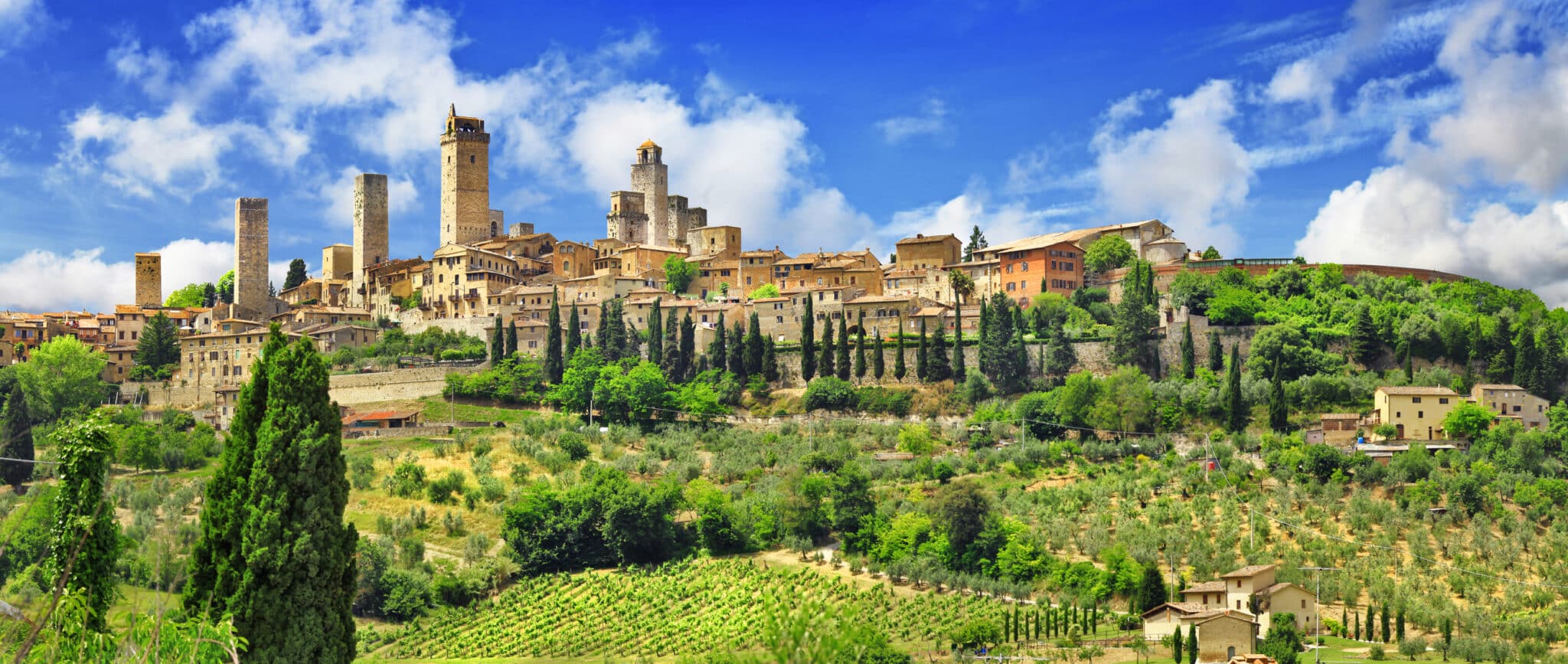
Le cobbled streets of San Gimignano offer a journey back in time, where every corner tells a story. Walking through these streets, one is surrounded by workshops, wine shops e inns that preserve local traditions intact. Shops sell handicrafts such as ceramics, textiles and jewellery, made according to techniques handed down from generation to generation. Wine shops offer the chance to taste local wines, while trattorias serve typical dishes of Tuscan cuisine that delight the palate.
One of the unmissable experiences in San Gimignano is the tasting of the Vernaccia di San Gimignanoa high quality dry white wine produced exclusively in this area. This wine, appreciated since Renaissance times, is perfect to be enjoyed while admiring the breathtaking views of the Tuscan hills. Vernaccia, with its fresh, fruity flavour, is the ideal accompaniment for local dishes such as ribollita, pappa al pomodoro and pecorino cheeses.
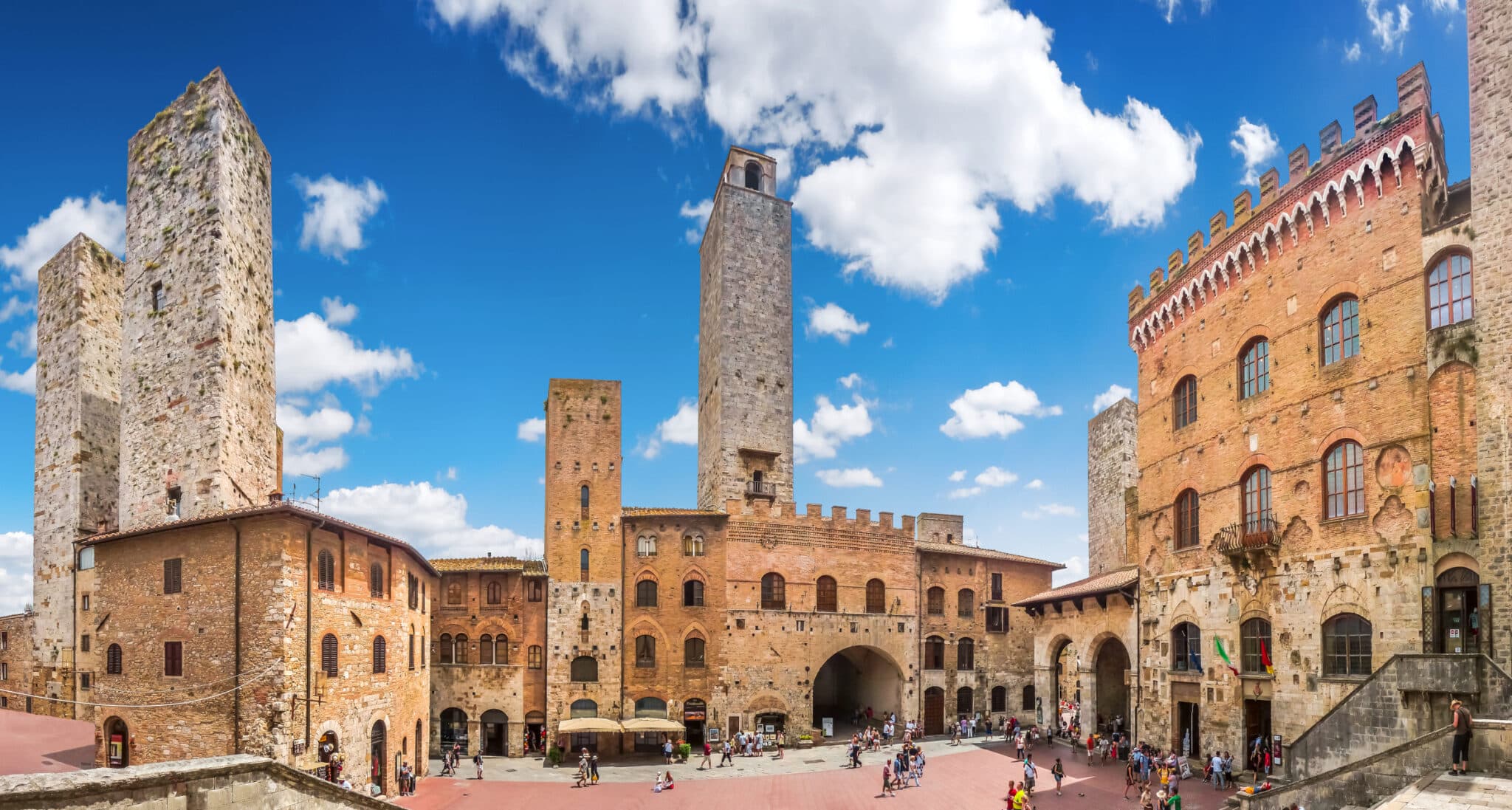
Among the attractions main attractions of San Gimignano are the Cathedral of San Gimignanoalso known as the Collegiate Church of Santa Maria Assunta, which houses magnificent frescoes dating back to the 14th century. Don't miss the Cistern Square, a picturesque triangular square surrounded by medieval towers and palaces, where a medieval market is held every year, attracting thousands of visitors. Another must-see is the Torre Grossa, the highest in the city, from the top of which you can enjoy a spectacular panoramic view of the surrounding Tuscan countryside.
Alberobello, located in Apuliais famous for its trulliunique limestone dwellings with conical roofs that date back to the 14th century. These buildings represent an exceptional example of rural architecture and have been declared UNESCO World Heritage Site. The trulli are built without the use of mortar, a technique that allows them to be easily dismantled and rebuilt, originally used to avoid paying taxes. Walking around Alberobello, one has the feeling of entering a fairy-tale world, where every house looks like a work of art.
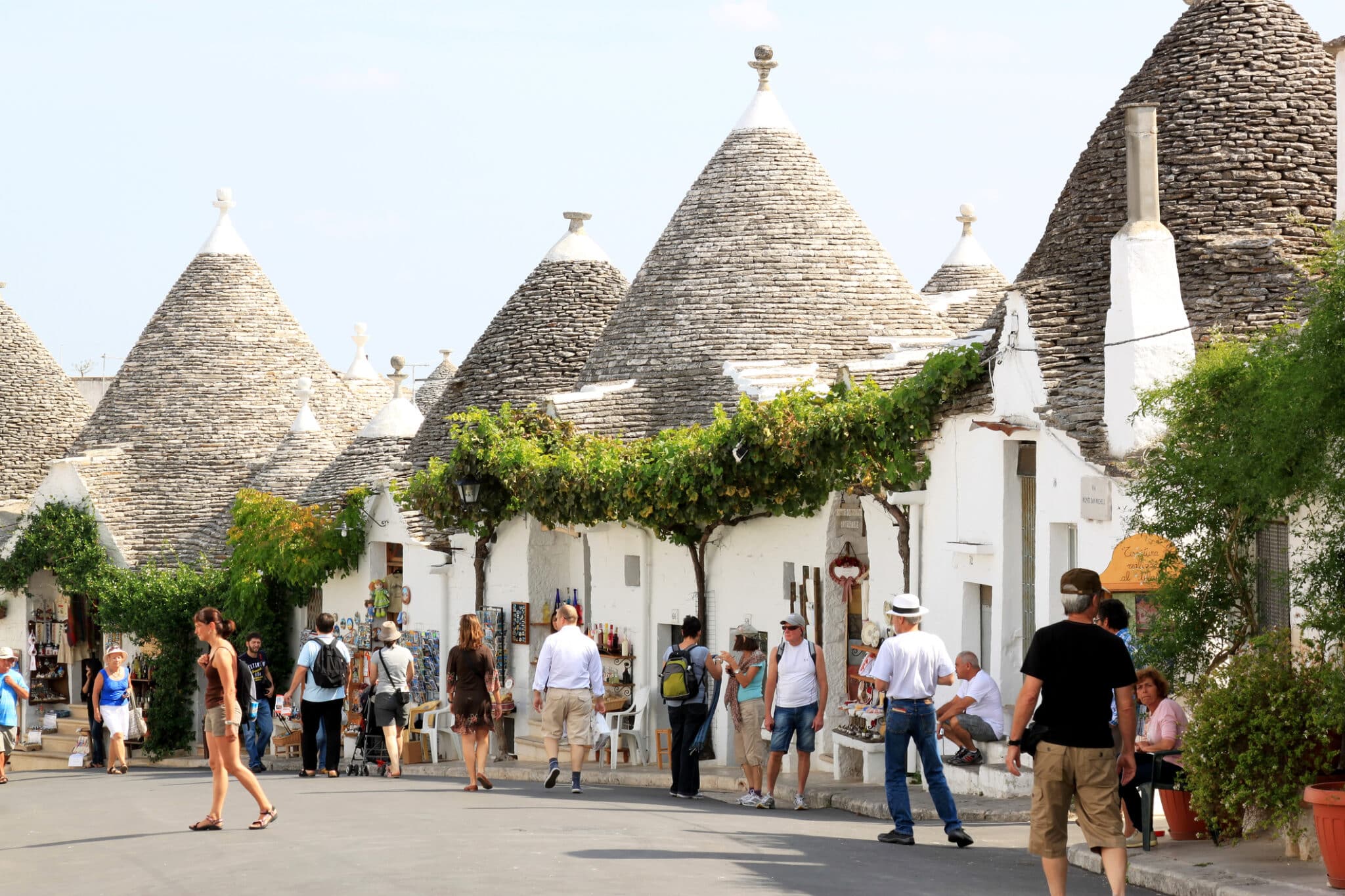
I narrow alleys of Alberobello are dotted with well-preserved trulli, many of which now house local craft shops. Here you can find typical Apulian products, such as hand-decorated ceramics, traditional textiles and unique souvenirs. La Church of St. Anthonyalso built in the trullo style, is one of the village's main attractions. This church, with its distinctive architecture, is an active place of worship and a point of interest for visitors wishing to learn more about local history and culture.
Among the trulli of Alberobello, one in particular stands out for its uniqueness: the Sovereign Trullo. This building is the only existing two-storey trullo and today houses a museum that tells the history and traditions of the village. Inside the museum, visitors can see how the trulli were furnished in the past, with period furniture and traditional utensils. The Trullo Sovrano also offers an insight into the construction techniques used for these buildings, making the visit not only fascinating but also educational.
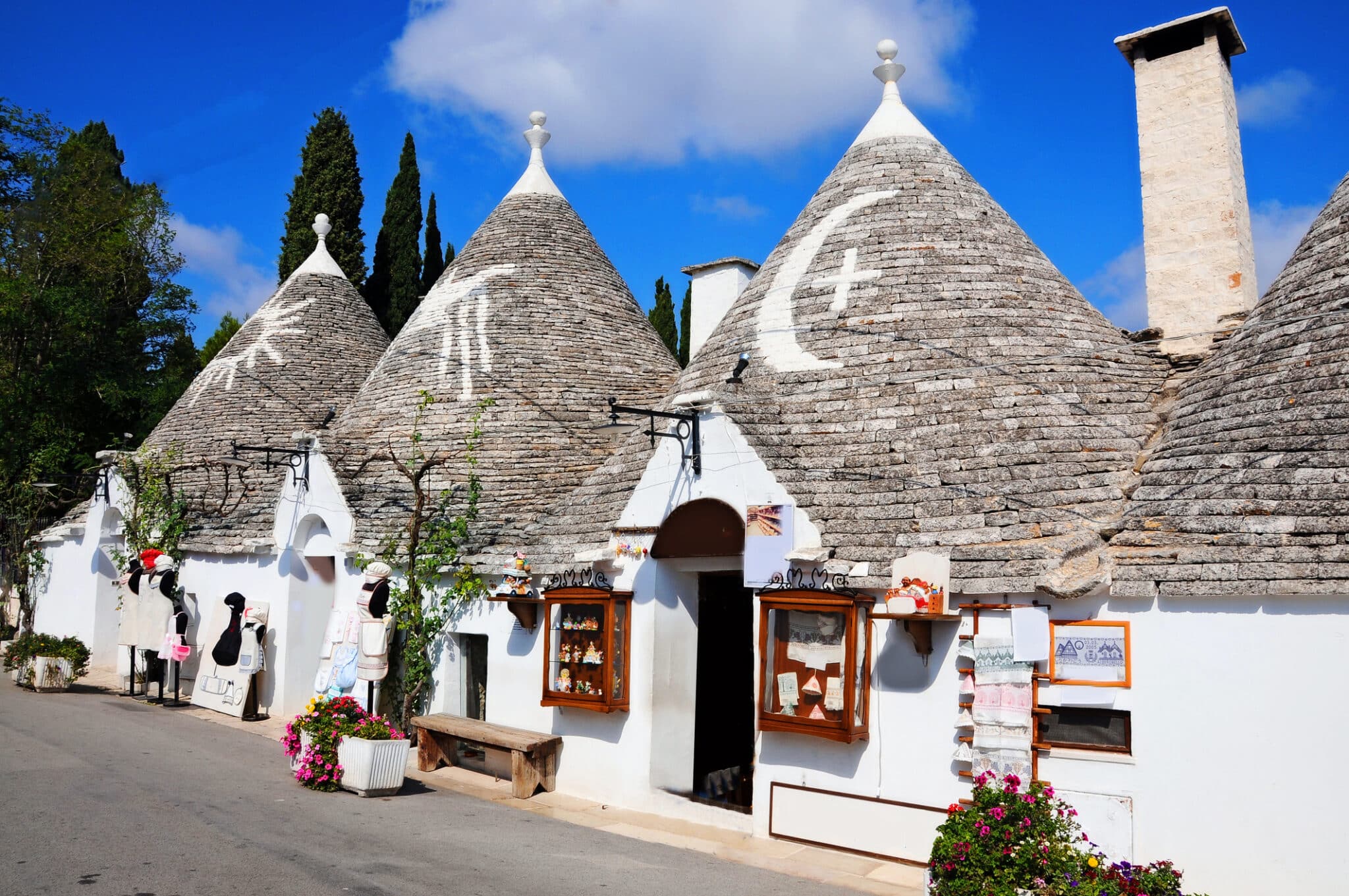
Alberobello is a lively and vibrant village, where numerous cultural events e festival. Among the most important is the Feast of Saints Cosma and Damiano, patron saints of the town, which is celebrated in September with processions, fairs and shows. During Holy Week, the streets of Alberobello come alive with historical re-enactments and religious traditions that attract visitors from all over Italy. These events offer a unique opportunity to immerse oneself in the local culture and experience moments of authentic conviviality.
Matera, located in Basilicata, is famous for its Sassiancient dwellings carved into the limestone rock. These caves, inhabited since the Palaeolithic era, have been recognised as UNESCO World Heritage Site for their exceptional testimony to a vanished civilisation.
Matera offers a unique combination of archaeology, history e culture. Visit the Sasso Caveoso and the Sasso Barisano to immerse yourself in the millennial history of the place. The Park of the Murgia Materana, with its frescoed cave churches, is another unmissable place for those who love art and nature.
Matera, located in Basilicatais one of the most fascinating and historically rich cities in Italy. Famous for its Sassiancient dwellings carved out of the limestoneMatera offers a unique spectacle. These caves have been inhabited since the Palaeolithic era, representing an extraordinary testimony of a millenary civilisation that has been recognised as UNESCO World Heritage Site. The city is often compared to an open-air museum, where every corner tells a story of human survival, ingenuity and adaptation.
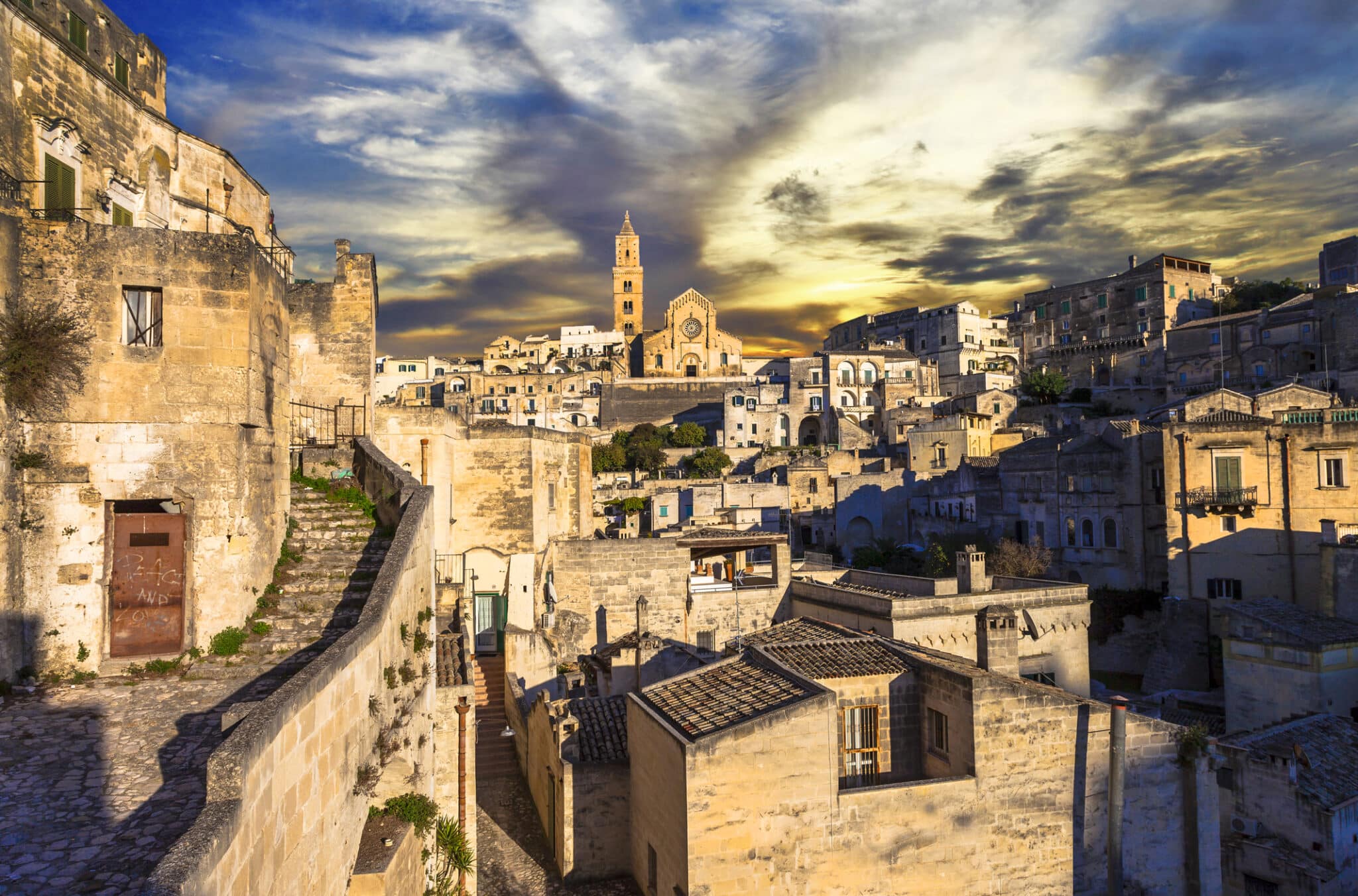
A visit to Matera cannot be complete without exploring the Sasso Caveoso and the Sasso Barisanothe two main areas of the ancient city. The Sasso Caveoso is particularly known for its cave dwellings that overlook narrow alleys and steep stairways. Here, visitors can see how the inhabitants of Matera lived until a few decades ago, in dwellings that seem to have been dug directly into the belly of the earth. Many of these houses are now museums offering a glimpse of daily life in the past.
The Sasso Barisano, on the other hand, is slightly more modern, with houses featuring stone-built façades and interiors carved into the rock. This area is full of craft workshops, workshops e restaurants offering typical products and traditional dishes of Lucanian cuisine. Walking through the streets of Sasso Barisano is like taking a trip back in time, immersed in an atmosphere steeped in history and tradition.
For lovers of art and nature, a must-see is the Park of the Murgia Materanaa vast natural area surrounding the city and home to numerous frescoed cave churches. These churches, many of which date back to medieval times, are carved directly into the rock and decorated with frescoes of extraordinary beauty. The park also offers scenic paths that allow you to admire the flora and fauna premises, as well as spectacular views on the city of the Sassi.
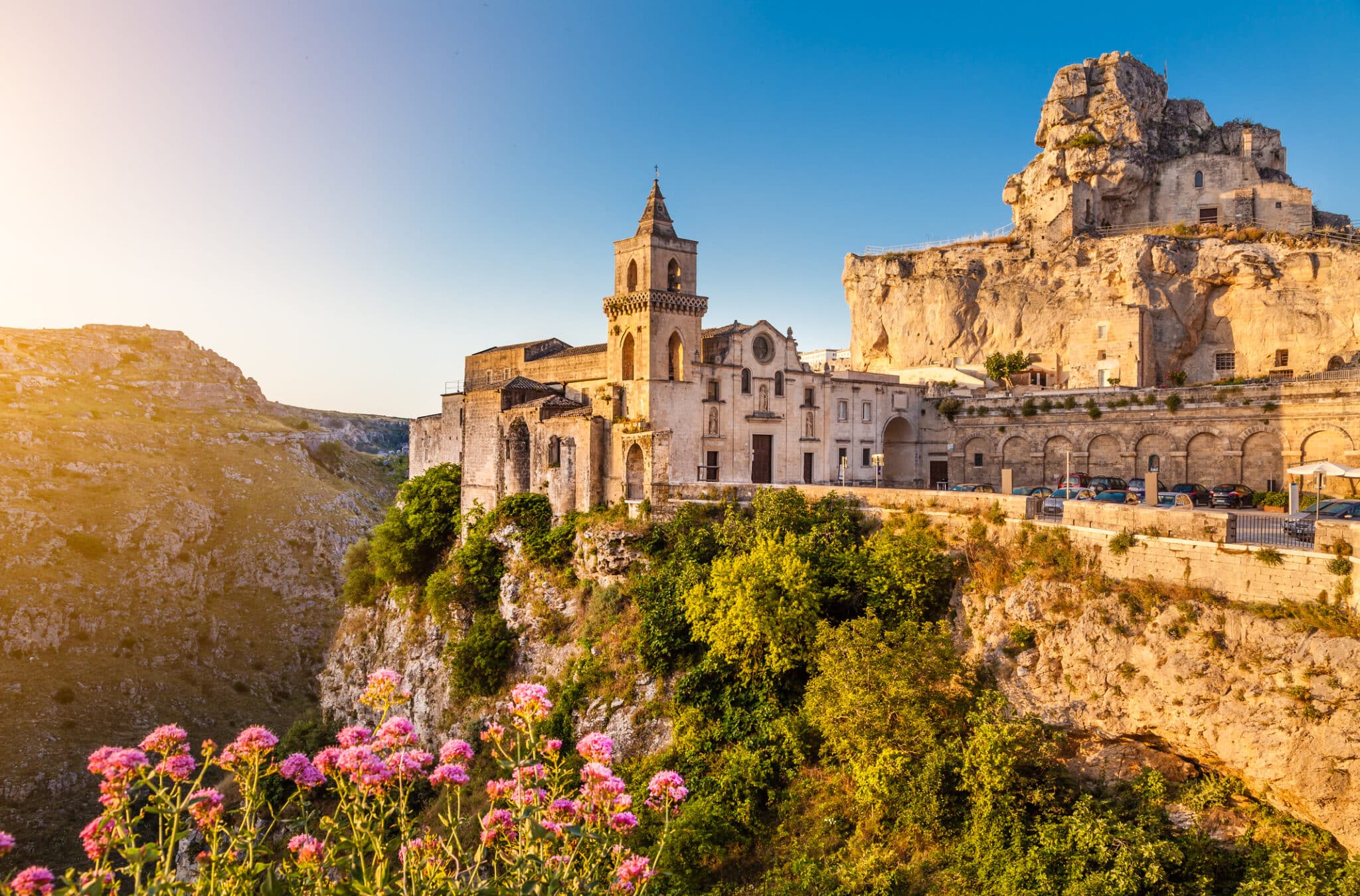
Matera is a living city, where tradition and modernity meet. Every year, the city hosts numerous cultural eventsincluding the European Culture Festival and the Night of the Sassian event celebrating local history and culture with shows, concerts and historical re-enactments. In addition, Matera has been European Capital of Culture in 2019, a recognition that further enhanced its artistic and cultural heritage.
Vernazzaone of the five villages that make up the Five Landsis renowned for its pictorial beauty and the authentic atmosphere one breathes among its narrow streets. This Ligurian village is a perfect example of harmony between nature and architecturewith its pastel-coloured houses overlooking a small natural harbour. The houses, picturesquely arranged on terraces sloping down to the sea, create a panorama that seems to be painted.
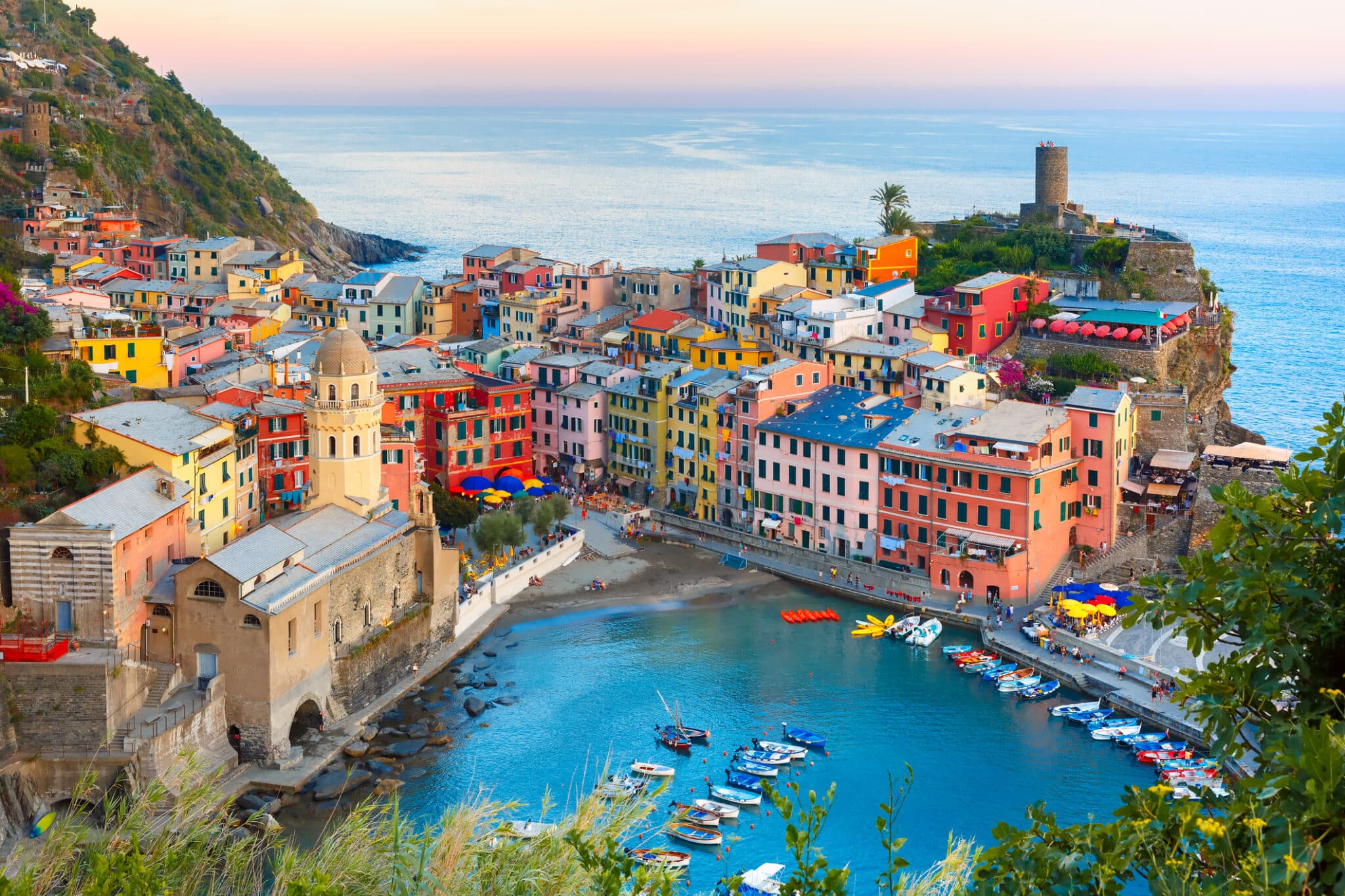
Vernazza's narrow streets lead to hidden squares e ancient churcheseach of which tells a story. La Church of St Margaret of Antiochbuilt in 1318, is one of the most significant buildings in the village. This church, with its octagonal bell tower and its position overlooking the sea, is a place of worship and a landmark for the local community.
One of the most fascinating aspects of Vernazza is the possibility of doing walks along scenic paths that link the village to other villages in the Cinque Terre. These paths offer spectacular views on the Ligurian coast, with breathtaking views of the sea and hillsides planted with vineyards and olive groves. The most famous trail is the Blue Trailwhich links Vernazza to Monterosso al Mare, offering unforgettable views along the way.
Vernazza is also a place rich in traditions e local culture. Every year, the village celebrates numerous festivals and fairs that attract visitors from all over the world. The most important is the Feast of St Margaretthe patron saint of the town, which is held on 20 July with processions, fireworks and religious events. Moreover, Vernazza is famous for its typical products, such as pesto alla Genovese, Sciacchetrà wine and olive oil, which can be tasted in local restaurants and craft workshops.
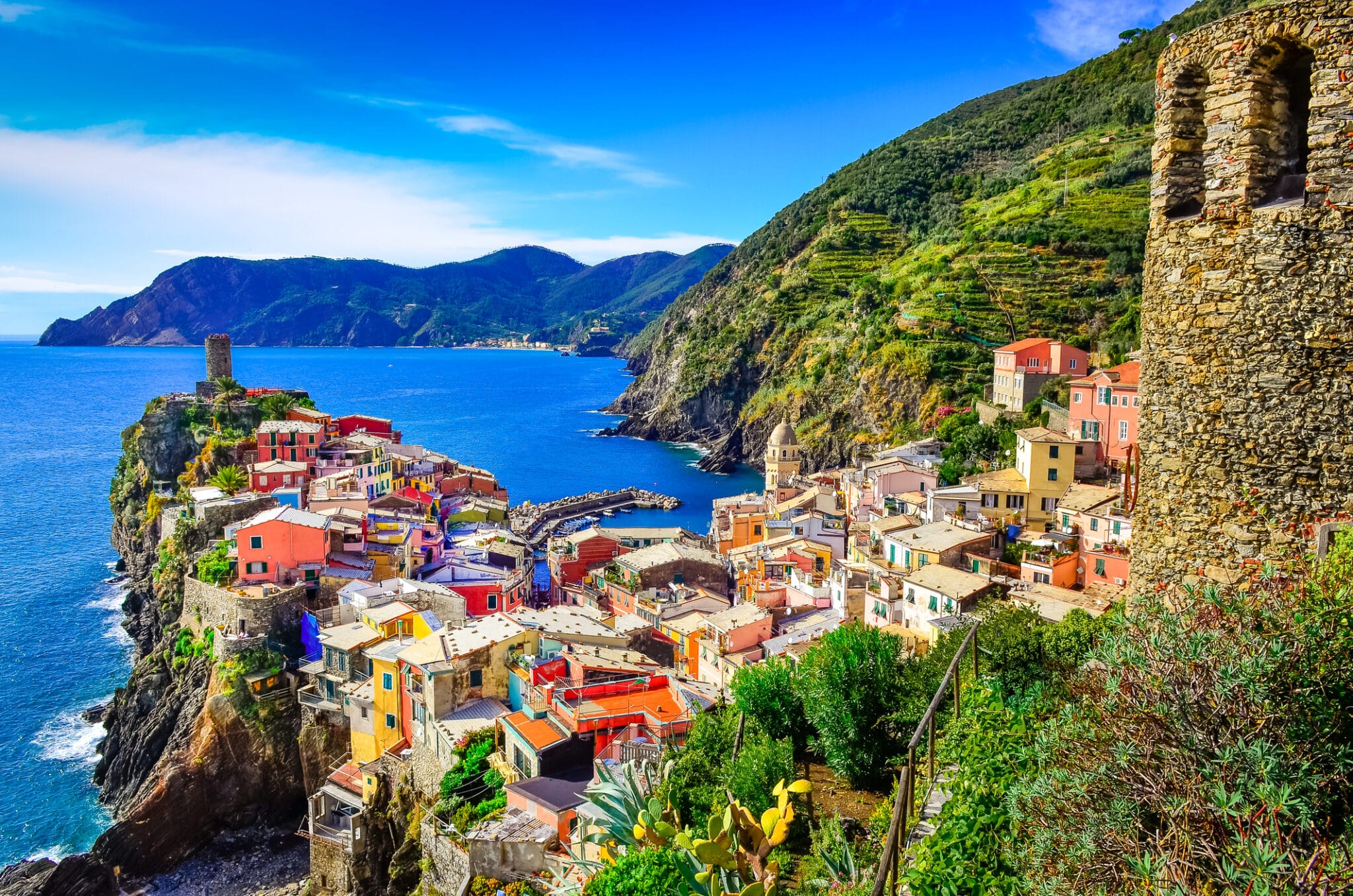
Visiting Vernazza means immersing yourself in a world of natural beauty, history e traditions. It is a place where time seems to stand still, offering a perfect refuge from the hustle and bustle of modern life. With its colourful houses, narrow streets and panoramic views, Vernazza is a unique experience for anyone wishing to discover the authenticity and charm of the Cinque Terre.
Civita di Bagnoregiolocated in the heart of the Laziois often called the 'dying city' due to the continuous erosion of the tuff on which it is built. This natural phenomenon constantly threatens the stability of the hamlet, making it a fragile and fascinating place at the same time. Reachable only by a long footbridge Suspended in the void, Civita di Bagnoregio offers visitors a unique and evocative experience, far from the hustle and bustle of the modern world.
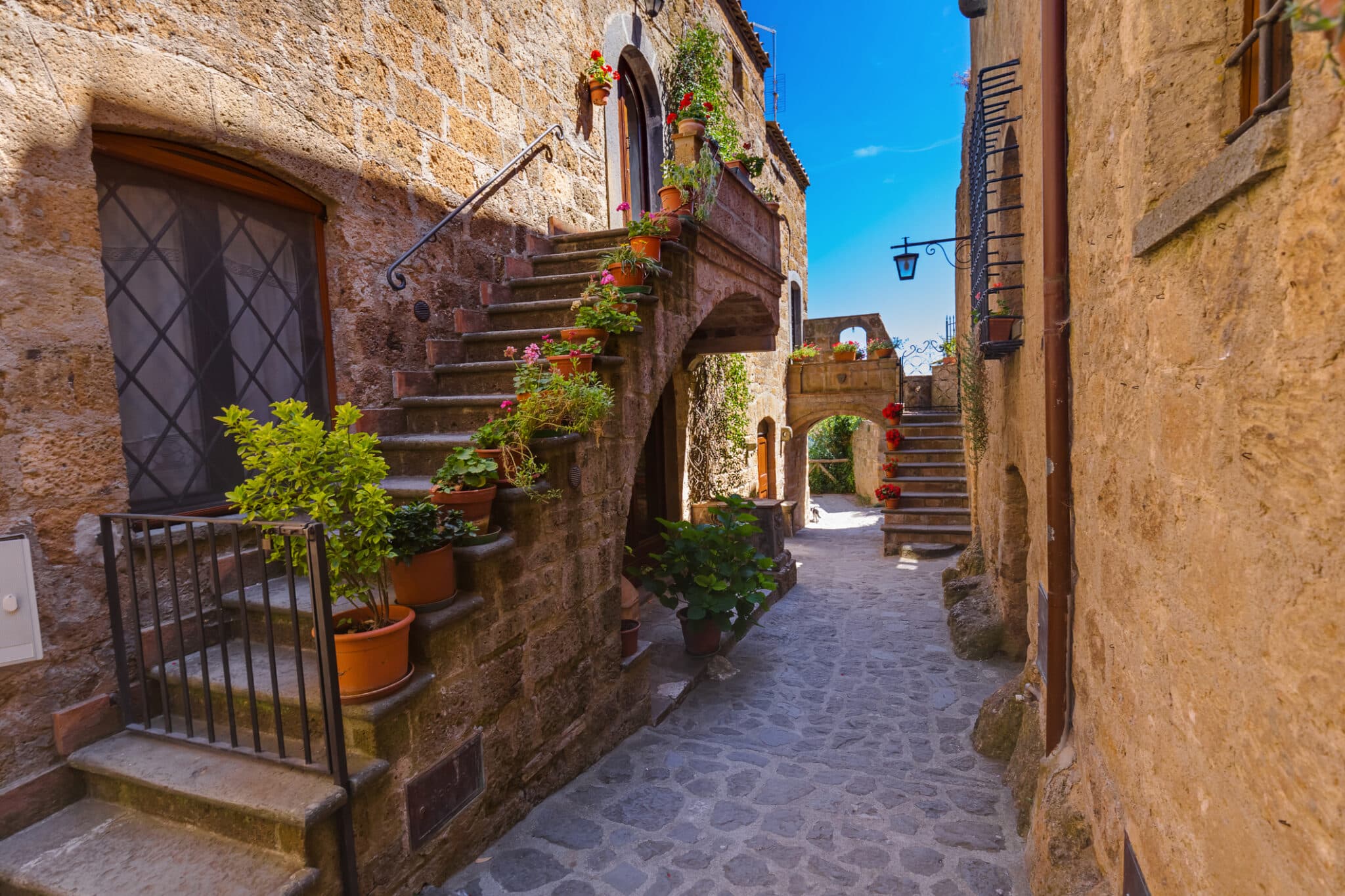
Once you cross the bridge, you enter an enchanted world of silent lanes e stone houses that seem to have come out of another time. Walking around Civita di Bagnoregio is like stepping back in time, where the rhythm of life is marked by tranquillity and silence. The breathtaking views valley below offer unforgettable views, especially at sunset, when the golden light of the sun illuminates the ancient walls of the village.
Civita di Bagnoregio is the ideal place for those seeking tranquillity e natural beauty. Here, far from the noise of the city, it is possible to relax and regenerate, immersed in a landscape of rare beauty. The few accommodation facilities in the village, such as small bed and breakfasts and inns, offer a warm and familiar welcome, allowing visitors to enjoy an authentic and unforgettable experience.
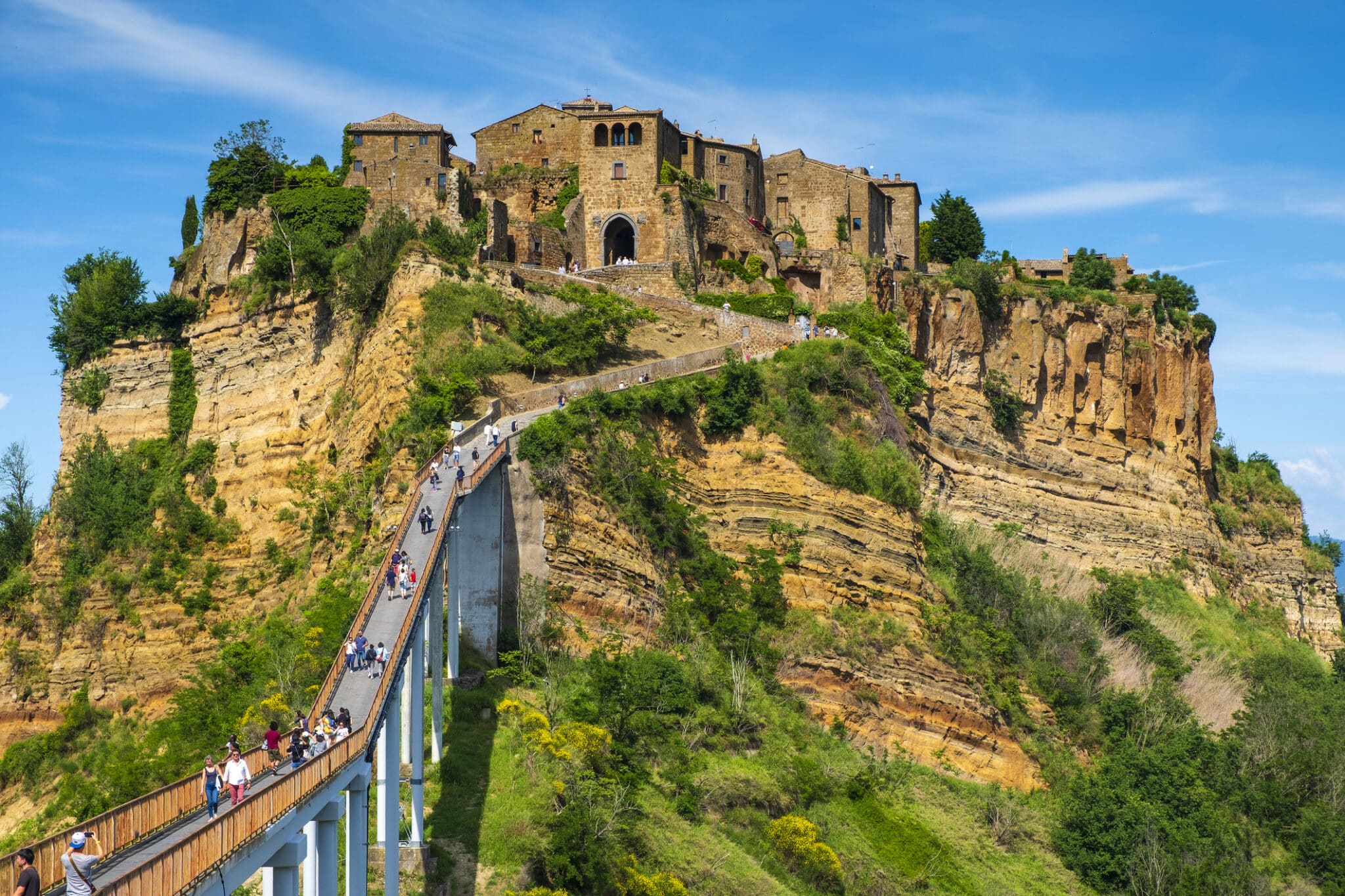
Despite its small size, Civita di Bagnoregio is a lively village rich in traditions. Every year, the village celebrates the Feast of St Bonaventurethe patron saint, with religious processions, folklore shows and craft markets. During the summer, the village also hosts cultural and musical events that liven up the evenings, offering visitors a unique opportunity to discover local culture and age-old traditions.
Fontainemore, located in Aosta Valley, is an enchanting village that embodies Alpine beauty and the tranquillity of an unspoilt valley. Surrounded by majestic mountains and green forests, Fontainemore is an ideal place for those seeking a refuge away from the hustle and bustle of the city. Its stone and wooden houses with slate roofs are typical of Valle d'Aosta architecture and give the village a rustic and cosy charm.
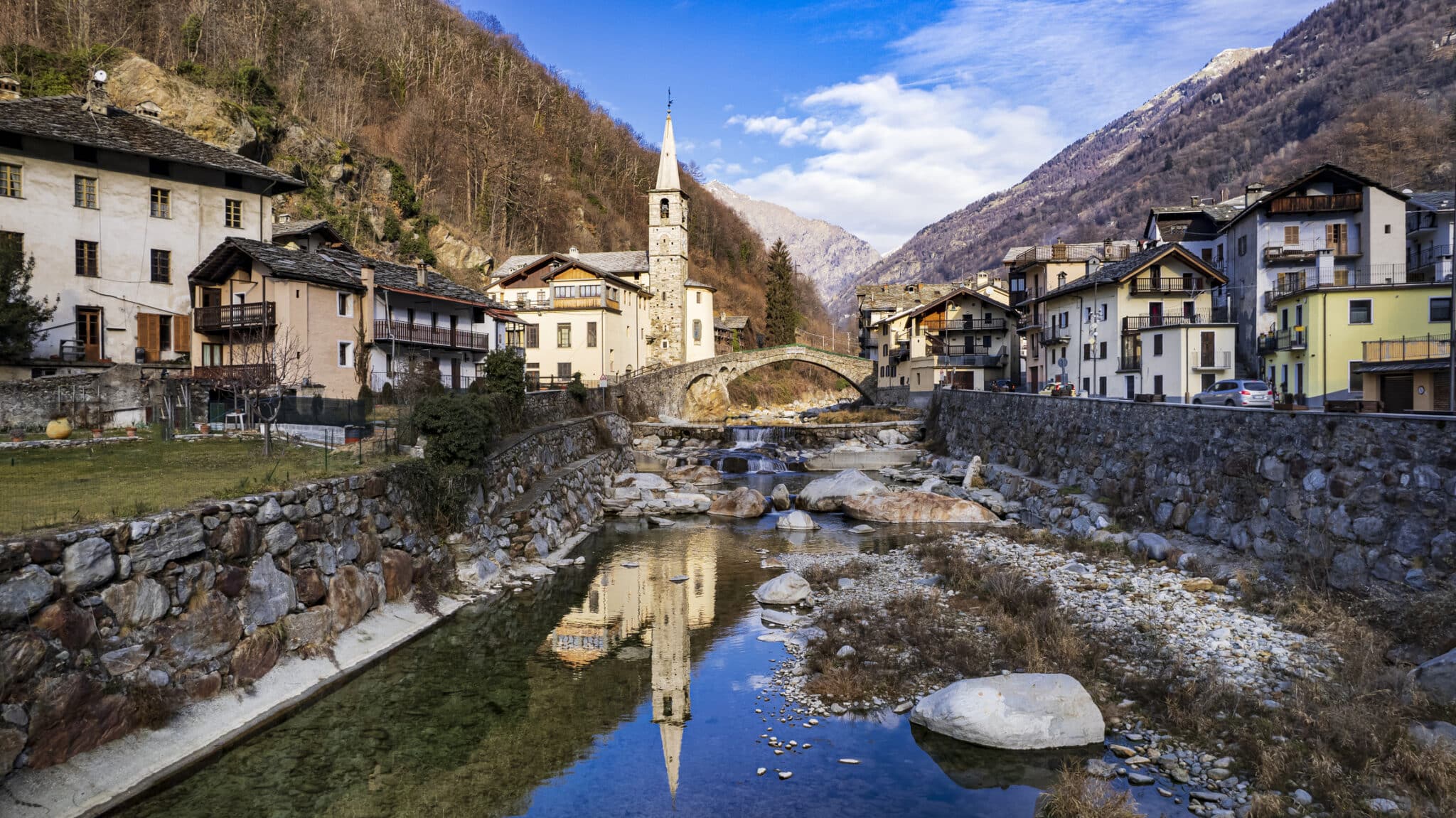
Fontainemore is a perfect destination for the nature lovers and theadventure. The village lies at the foot of the Mont Mars Natural Parka nature reserve offering a wide range of hiking trails suitable for all levels of experience. Here, visitors can explore alpine lakes, spectacular waterfalls e secular forestssurrounded by a landscape of extraordinary beauty. In winter, the area is transformed into a paradise for cross-country skiers and snowshoe hikers, with trails running through snow-covered, silent landscapes.
In addition to its natural beauty, Fontainemore is a village rich in culture e traditions. Every year, the town celebrates numerous festivals and festivals that reflect the local culture and traditions. Among the most important is the Feast of St Bartholomew, the patron saint of the village, which is held in August with processions, traditional dances and tastings of typical products. Visitors can discover the ancient techniques of wood and stone working, which have been handed down from generation to generation and still represent an important source of income for the villagers.
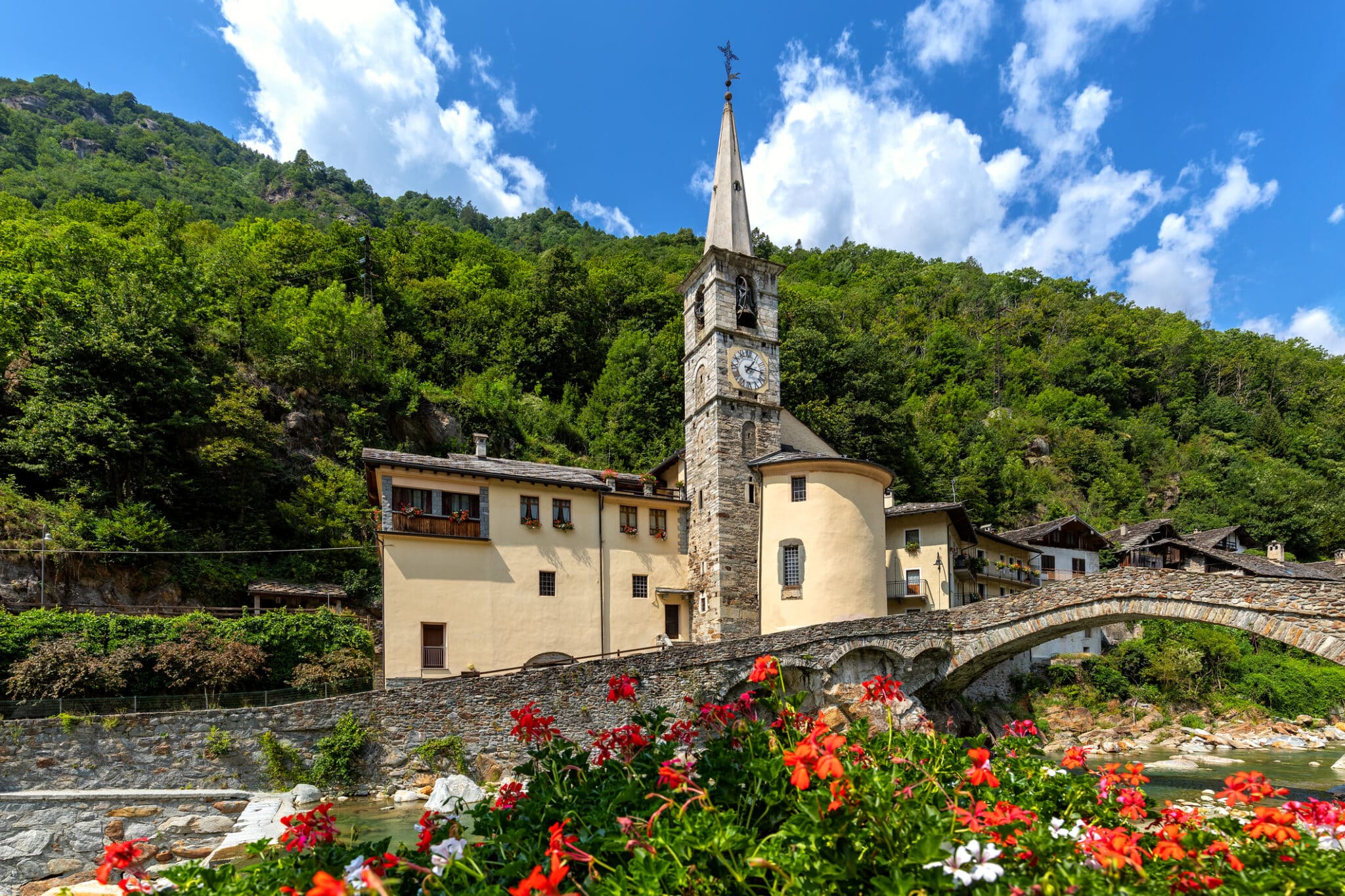
La Valle d'Aosta gastronomy is another reason to visit Fontainemore. The village is famous for its typical productssuch as fontina, a soft cheese with a delicate flavour, and Arnad lard, a sausage with a unique taste. Local trattorias and restaurants offer dishes from the traditional Valle d'Aosta cuisineprepared with genuine ingredients and old recipes. Specialities not to be missed include polenta concia, Valdostana-style soup and desserts made with chestnuts and honey.
Visiting Fontainemore means immersing yourself in an environment of serenity e beautywhere the unspoilt nature marries with the culture and the local traditions. This village offers an authentic and unforgettable experience, ideal for those who wish to discover the purest soul of the Aosta Valley and experience moments of peace and relaxation in a natural setting of rare beauty.
Exploring the most beautiful villages in Italy, such as San Gimignano, Alberobello, Matera, Vernazza e Fontainemoremeans immersing oneself in a journey between history, culture e breathtaking landscapes. Each village offers a unique experience, from the medieval towers of San Gimignano to the trulli of Alberobello, from the sassi of Matera to the panoramic views of Vernazza, to the natural wonders of Fontainemore. These enchanting places represent the authenticity and beauty of Italy, offering moments of tranquillity e serenity.
1. What is the best time to visit San Gimignano? The best time to visit San Gimignano is spring and autumn, when the climate is mild and the tourist crowds are fewer.
2. Is Alberobello accessible by public transport? Yes, Alberobello is well connected by public transport, including buses and trains from major Apulian cities.
3. What are the culinary specialities of Matera? Matera is famous for its bread, cialledda (a stale bread dish) and lamb.
4. How do you reach Vernazza? Vernazza is easily accessible by train from nearby towns such as La Spezia and Levanto. It is also accessible by sea and by hiking trails.
5. Does Fontainemore offer outdoor activities? Yes, Fontainemore is perfect for outdoor activities such as excursionscross-country skiing and snowshoeing, thanks to its location in the Mont Mars Natural Park.
We are a young Web Agency with more than 10 years of experience, we love travelling and discovering new places, that is why we write every day on Italia Delight our travel site.

Italia Delight is your definitive guide to Italian restaurants, offering a comprehensive directory and web marketing services to enhance every dining experience. Discover, taste and connect with Italian tradition.
To provide the best experiences, we and our partners use technologies like cookies to store and/or access device information. Consenting to these technologies will allow us and our partners to process personal data such as browsing behavior or unique IDs on this site and show (non-) personalized ads. Not consenting or withdrawing consent, may adversely affect certain features and functions.
Click below to consent to the above or make granular choices. Your choices will be applied to this site only. You can change your settings at any time, including withdrawing your consent, by using the toggles on the Cookie Policy, or by clicking on the manage consent button at the bottom of the screen.